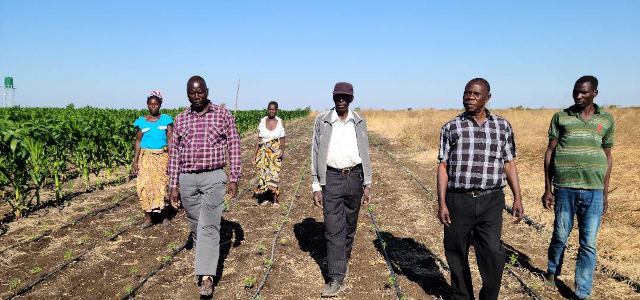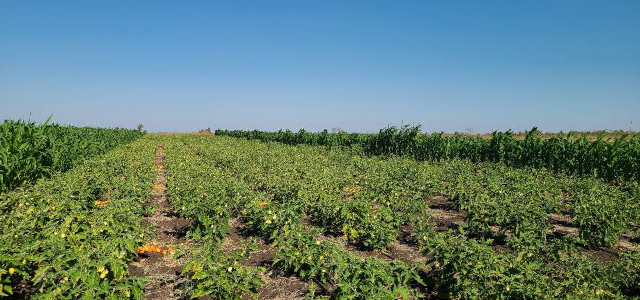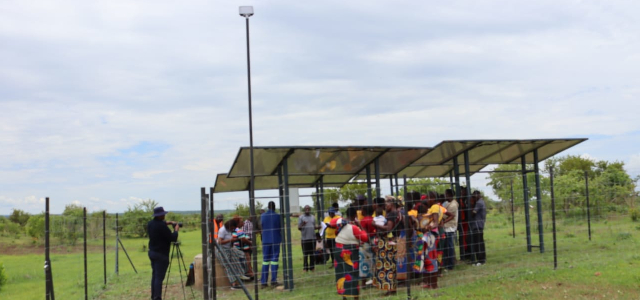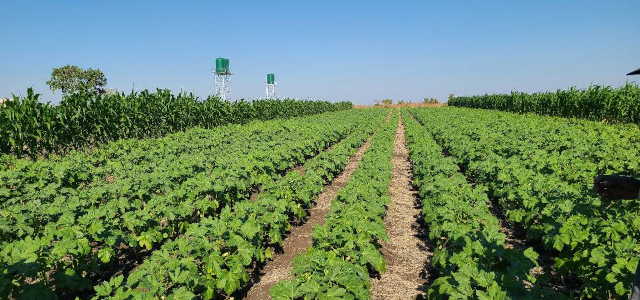The project is being implemented under the Intra-African, Caribbean, and Pacific (ACP) Global Climate Change Alliance Plus (GCCA+) Programme, in the Southern Africa Development Community (SADC) region, titled Water, Energy, and Food. The Programme, which is funded by European Union, was implemented on behalf of the SADC Secretariat by the Southern Africa Development Community (SADC) Centre for Renewable Energy and Energy Efficiency (SACREEE), Global Water Partnership Southern Africa (GWPSA) and Centre for Coordination of Agricultural Research and Development for Southern Africa (CCARDESA), in collaboration with the local government and traditional leaders.
The project's objective was to showcase the implementation of Water, Energy, and Food nexus approaches as a viable strategy for adapting to climate change. To achieve this, the project brought together the expertise of the Global Water Partnership (GWP) in Integrated Water Resources Management, CCARDESA in climate-smart agriculture, and SACREEE in renewable energy.

Members of the irrigation scheme tour part of the field with recently installed irrigations pipes
A solar-powered drip irrigation system was installed to provide water on a 4-hectare piece of land, the irrigation system is expected to benefit more than 800 people. The local farmers were also trained on the maintenance of the irrigation system, agricultural production, marketing, gender transformative approaches, and social inclusion so that they will be able to efficiently use the irrigation for farming and to maintain it.
The handover ceremony was officially opened by a representative of the Mukuni Royal Establishment - Mr. Elias Nzala, on behalf of His Royal Highness Chief Mukuni. In his remarks, Mr. Nzala hailed SADC for empowering the community of Katapazi with a scheme that will improve their livelihoods.
“Katapazi area is very vulnerable to the effects of climate change and has been affected by unusual weather events in the recent past, including floods, intense rainfall, high temperatures, and droughts. This has negatively affected food production in the area and has also resulted in the loss of livestock,” he said as he urged the community to take full ownership of the project.

Tomatoes being grown on one part of the field
Delivering the keynote address Mr. Elias Siamibila, District Commissioner, expressed gratitude to SADC and the Government of Zambia for uplifting the lives of over 9000 people of Katapazi with a solar powered borehole, water kiosk, animal water trough, and solar mobile charging port for farmers.

Solar panels to help pump water for irrigation at the pilot project site in Zambia
“The provision of decentralised clean energy and water is a key enabler to mitigating the effects of climate change and will contribute to the attainment of the Sustainable Development Goals; specifically, SDGs 2, 6, and 7 that strive to achieve zero hunger status, enable access to clean water and sanitation for all, and increase access to affordable and renewable energy respectively.”
Mr. Siamibila also appealed to the farmers in Katapazi to adopt sustainable ways of farming and avoid clearing forest reserves, as this is one of the main drivers of deforestation in the area. He also urged Water, Energy, and Agriculture experts to continue monitoring the project and providing capacity-building to the community that will assist with the maintenance of the irrigation system.
Speaking at the same event Mr. Kuda Ndhlukula, Executive Director – SACREE, explained the overall objective of the GCCA+ WEF Nexus Project, which is to improve livelihoods of the community through the adoption of Distributed Renewable Energy (DRE) Systems for Productive Use. He further stated that the specific objectives of the Project were to:
- Increase access to clean and affordable RE technologies for productive use;
- Promote climate change mitigation and adaptation measures in rural communities;
- Create economic empowerment opportunities for women and youth in selected SADC countries; and
- Promote an integrated WEF nexus through RE-powered and professionally managed DRE systems for the Productive Use of Renewable Energy leading to an environmentally sustainable framework, improving the local economy, environment, and public health.
Ms. Catherine Bwali, Acting Kazungula District Agriculture Officer, explained the climate-smart agriculture component of the project, stating that the Government of Zambia had prioritised climate change because of its impact on agricultural production and productivity. Ms. Bwali called for concerted efforts to improve the resilience and stability of agricultural production systems under climate change conditions to minimise the devastating effects of climate change on crop yields, livestock, fish, and other farm products. The farmers have since received training in Climate Smart Agriculture and Irrigation, Water Management, among others.
And speaking on behalf of the, Mr. Mafayo Ziba, Assistant Director - Ministry of Energy ,appealed for the upscaling of the project to other parts of the country so as to promote the use of clean energy in reducing the adverse effects of climate change.
Mr. Eight Munomba, Headman - Katapazi Village, expressed gratitude to SADC and its implementing partners on transforming the socio-economic status of his people. He further appealed for continued monitoring of the project to keep the community accountable to the project objectives.
“I am grateful that this project has particularly helped the women and girls of Katapazi to access water without covering great distances. I, therefore, appeal to all of you to take great care of this infrastructure that has been handed to us today,” said Mr. Munomba.
The GCCA+ WEF Nexus projects was established on the backbone of the WEF Nexus Approach. The Water-Energy-Food Nexus (WEF Nexus) approach highlights the interdependence of water, energy, and food security that underpin that security.
